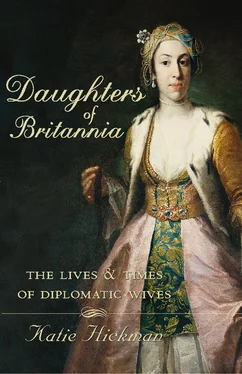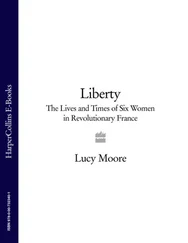Many aspects of Mrs Blanckley’s life in Algiers were delightful. The consular corps was a small, close-knit community, but large enough to provide an ample supply of balls, dinners, banquets and masques. It did not lack for elegance either: the wife of the French consul had connections at the imperial court in Paris, from whence she would bring back details of all the latest fashions. The Europeans in Algeria were always very well dressed, ‘in accordance to the taste of the undisputed emporium of fashion’, even more so than in London, where they ‘sighed in vain for a copy of Le Journal des Modes ’.
When not engaged in diplomatic entertainments, Mrs Blanckley spent a good deal of time visiting the Algerian women in their harems. Unlike Mary Sheil, whose Victorian sensibilities were shocked by the deliciously bawdy talk of the women’s quarters, Mrs Blanckley, a woman of a more liberal age, was struck by the beauty and courtesy of the Algerines. One of the first calls she and her daughters paid was on their dragoman’s (interpreter) new wife, whom they found sitting ‘in lonely grandeur’, laden with so many pearls and jewels that she could scarcely move beneath the weight of them. She wore so many rings in her ears, Mrs Blanckley recorded later in her journal, ‘that her ears were quite bent down, hanging in the elephant style’. At the wedding of the daughter of the Cadi , or chief judge, a few months later she was even more amazed by the opulence of the Algerian women: ‘My eyes were perfectly dazzled by the splendor of the jewels by which their salamas (caps) and persons were covered, whole bouquets of roses, jessamines, peacock feathers and butterflies were completely formed of diamonds,’ she wrote. The bride herself was so bedecked with jewels that ‘she was quite unable to bear the weight of her salama without the support of two of her attendants, who walked on either side of her and held her head.’
The greatest spectacle of all, however, came when she visited the Dey’s wife herself. As the wife of the British consul, Mrs Blanckley was an important visitor, and the Dey’s women took the greatest possible care over their preparations. They made iced sherbets of orange flower water, together with vast quantities of different foods – meat, poultry, pastries and sweetmeats – which she ate with beautiful rosewood spoons, their tips inlaid with amber and coral. Although she enjoyed this feast sitting cross-legged on the floor with the other women, Moorish fashion, every comfort had been thought of: the table on which the food was set was inlaid with silver and mother-of-pearl; her hands were washed with scented water poured from silver jugs; exquisitely embroidered napkins were brought for her to wipe her fingers on.
On her arrival at the palace harem, Mrs Blanckley had found that not only the women, but the whole room was heaped with jewels. There were jewels spread out over the tables and shelves; there were even jewels strewn across the floor – emeralds, sapphires and rubies which seemed to be growing up out of the cut-velvet carpets like so many fantastical flowers. Although Mrs Blanckley was perfectly sensible of the honour they were paying her – ‘I am the first and only Consul’s wife of any nation who has been so highly distinguished,’ she recorded with pride – she found this extravagance rather overwhelming: ‘My eyes were so dazzled with all the splendour I had beheld at the palace, that I felt quite glad when all these visits were concluded.’
There were other reasons why she might have been glad to conclude these visits. As the British consul’s wife, Mrs Blanckley was not only able to enjoy the greatest refinements and courtesies that the Algerians had to offer. She was also exposed to an altogether more sinister side of life. The Blanckleys’ position in Algeria was by no means as secure as it appeared. Although in theory they were protected by their diplomatic status, in practice they were entirely at the mercy of a series of petty despots, the Deys, who ruled Algiers under the nominal suzerainty of the Ottoman sultans.
Part of the Ottoman empire since the early sixteenth century, by the eighteenth Algiers had become a pirate state, preying mercilessly on shipping in the Mediterranean. Some aspects of Mrs Blanckley’s account of their life in Algiers make gruesome reading. Daily life for the ordinary citizen was bloody, brutal and, all too often, short. Both smallpox and the plague were frequent epidemics, although it was a crime punishable by death to even refer to the plague, let alone take precautions against it, until the Dey chose to make the pestilence official. * Slaves and criminals were kept in the bagnio , or prison, from whence they were taken by day to work in the stone quarries. At night they were forced to wear chains so heavy that even a strong man could barely support the weight of them. The most vicious punishments were handed out with impunity for the most arbitrary of crimes. ‘The poor Jew who was bastinadoed is not yet dead,’ Mrs Blanckley wrote soberly, ‘but has been obliged to submit to lose 3lbs of flesh from the part where the bastinadoes were inflicted.’ His crime had been to disturb the Dey with the noise of his hammer.
Reminders of the tyrannical powers of the Dey were ever present, even within the diplomatic community. The Danish consul was thrown into the bagnio like a common slave when the expected tribute from Denmark did not arrive on time, and, to the horror of his distraught wife, forced to wear chains which weighed a crushing 60 pounds. When Mr Blanckley led a deputation of diplomats to plead for their colleague, the Dey was so enraged that he ‘bounced up from his seat and fell down again, his legs still retaining their tailor position, whilst he pulled his beard … and literally foamed’. The same fate later befell both the Dutch and the Spanish consuls, with the threat (happily never carried out) that the latter’s wife and eight children would be taken to the market place and sold as slaves.
The Blanckleys themselves once came under a similar threat. ‘I am much fatigued, having passed the last several nights in packing up our valuables and clothes, which I am obliged to do with great secrecy, lest our slaves might give information, and we know not from one hour to the next what may be our destiny,’ Mrs Blanckley wrote anxiously. This time the Dey’s wrath had been aroused by the fact that some vessels sailing under the Algerian flag had been seized by the British in nearby Malta. Although a British gunship, La Volontaire , was sent in to protect them from possible repercussions, Mrs Blanckley, perhaps remembering the Dey’s previous rage, was still understandably agitated. ‘The Minister of the Marina has been very unguarded and violent in his expression against the person of the Consul,’ she wrote; ‘and we have but too great reason to dread being put into chains.’
Although it was her father who held the position of consul, Elizabeth Blanckley was never in any doubt about her mother’s crucial involvement in his work. While Mr Blanckley fulfilled the public role, behind the scenes Mrs Blanckley worked tirelessly to support him. To enable the family to meet all their expenses (a consul’s salary at that time was nominal) Mrs Blanckley regulated her domestic affairs with the greatest possible economy. ‘Rising early and retiring late’, she oversaw not only the immediate household, but also the vegetable garden, orchards, dairy, and even the large tracts of land on which they kept their own herds and flocks. According to Elizabeth, ‘From these resources our large family, and constant and numerous guests of all degrees, were in a great measure supported.’
It was against this background of domestic harmony that the Blanckleys’ most important work was carried out. While they survived the worst excesses of the Dey’s regime, some of their countrymen were not so fortunate. One of Mr Blanckley’s main duties in this ‘very nucleus of piracy’ was to claim any British national taken into slavery by the Algerians. He was able to do this under the terms of a treaty agreed with the Turkish Sultan in 1761, known as the Ottoman Capitulations, which also gave European consuls wide-reaching powers of jurisdiction over their countrymen in both civil and criminal cases, liberty of movement around the Dey’s dominions, freedom from restrictions in commerce and religion, and (in theory at least) inviolability of domicile.
Читать дальше












